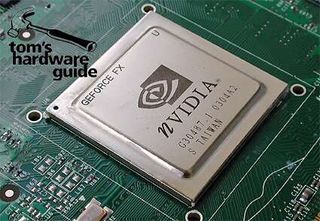Water March: Gainward CoolFX
Introduction
Hardly any cooling solution has been more criticized than NVIDIA's FXFlow solution for the GeForceFX 5800 Ultra reference design. Due to the extremely high heat development of the 125 million transistor chips, unusual cooling methods were called for, but NVIDIA's solution churned out unusually annoying noise levels. NVIDIA made improvements, though, by turning off the fan completely in 2D operation and reducing the fan's rotation speed in 3D operation. However, it still cannot be said that they've come up with a quiet solution.

Gainward's CoolFX is based on the watercooling solution from Evercool.
A few card manufacturers such as Chaintech, Abit and Gainward are therefore offering some of their own cooling solutions for the GeForceFX 5800 Ultra cards. These are supposed to achieve better cooling performance while maintaining a significantly lower noise level.

The GeForceFX 5800 Ultra GPU. While in operation, the chip gets very hot, thus requiring a more elaborate cooling solution, most of which are quite noisy, as well.
Gainward raises the bar a notch, bringing enthusiasts the CoolFX, a complete watercooling set for GeForceFX cards, whose prototype could already be seen at the CeBIT. The manufacturer Evercool contributed to the main component of the set: a combined radiator/ pump module in the form of a 5.25" drive. This module is about the size of a DVD drive and can be installed in normal drive bays of PC cases. For the graphics card, a cooling element for the memory and the GPU is available.
In this article, we'll look at each component individually.
Stay On the Cutting Edge: Get the Tom's Hardware Newsletter
Get Tom's Hardware's best news and in-depth reviews, straight to your inbox.
Most Popular


